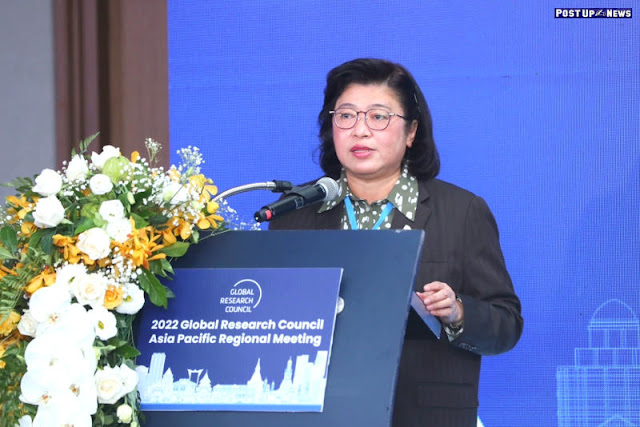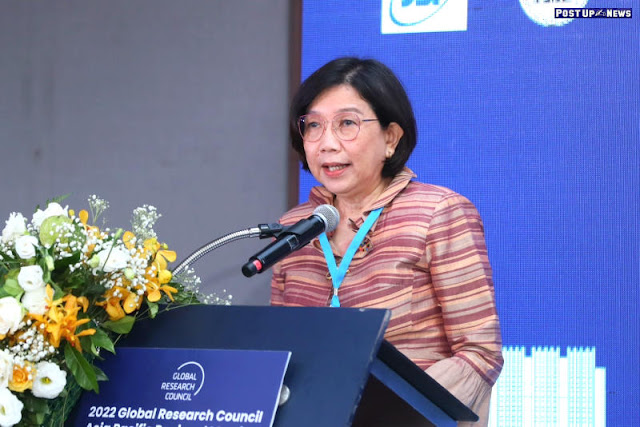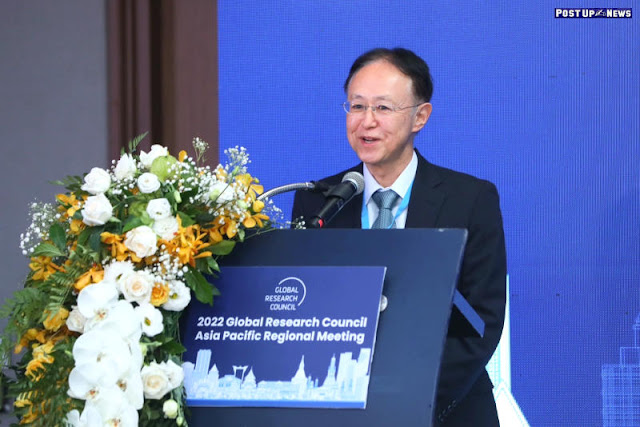
Thailand Science Research and Innovation (TSRI) together with the National Research Council of Thailand (NRCT), the Program Management Unit for Human Resources & Institutional Development, Research and Innovation (PMU-B) and in collaboration with two Japanese research funding agencies namely Japan Science and Technology Agency (JST) and Japan Society for the Promotion of Science (JSPS) jointly host the 2022 Global Research Council Asia-Pacific Regional Meeting from 21st -23rd November 2022 in Bangkok. For the first time, Thailand selected to be the host country of the GRC Asia Pacific Regional Meeting. A hundred of the global funding leaders from seventeen countries convene at this event. These include but not limited to Brazil, China, Indonesia, Iran, Italy, Japan, Myanmar, New Zealand, the Philippines, Qatar, Saudi Arabia, Singapore, South Korea, Sri Lanka, Thailand, Timor Leste, and Viet Nam.
The goal of the meeting is to provide a platform where global funding leaders in particular from Asia-Pacific region could share and exchange their practice. The participants will go through the topics that are carried out from the Global Research Council Annual General Meeting in Panama last June. These include the issues like the climate changes, impact oriented reward and recognition mechanism for researchers in particular during the post-COVID 19, and multilateral collaboration workstreams. As the national budget policy body to promote Thailand’s science, research, and innovation, TSRI together with NRCT, the current GRC Asia-Pacific Governing Board; and the PMU-B will assure that Thailand could plug in to their multilateral collaboration workstreams.
At the meeting, His Excellency Prof. Dr. Anek Laothamatas, Minister of Higher Education, Science, Research, and Innovation (MHESI) highlighted the importance of research and the policy of MHESI to support Thailand’s goal of becoming a developed country within 15 years with the strategy of promoting Thailand to be a “researching nation” - Thai people should be able to reap the benefits of research both academically and in everyday life. The Minister also emphasized how science, social science, humanity and arts should go hand in hand to drive high-impact research. He also touched on the Suvarnabhumi studies, one of the five pillars under the Thailand Academy of Social Sciences, funded mainly by NRCT. Through the Suvarnabhumi Studies, it allows us to reconceive and find more of our history. Thailand's history could date back to 2,500-3,000 years ago, not 700 years as we often see in high school textbooks. Without science and technology such as LiDAR or Carbon dating technology, it would not be possible to trace back to where we were, said the Minister.
Another highlight that the Thai host demonstrated is a showcase of the Program Management Unit for Area-Based Development (PMU-A) that discusses the success of our funding scheme to promote the transdisciplinary research. PMU-A has partnered with universities, local administrative officers and other stakeholders to develop a culture-based economy, resulting in the creation of 6,000 cultural community enterprises, contributing to THB 200 million revenue to communities across the country.
The
input from this meeting will be shared and reported at the next Annual Meeting scheduled
on May 29th – June 3rd, 2023 in the Netherlands. Thus,
this GRC Asia Pacific Regional meeting becomes a good opportunity for the
funding agencies and key stakeholders under our national science, research, and
innovation ecosystem to learn and share our experiences with other member
countries. After all, this could lead to a global policy framework resulting in
higher-impact research in the future.

















